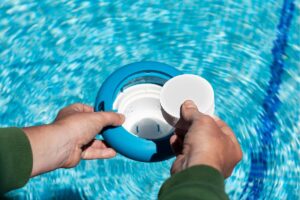From the benefits of the humid pool environment to the potential irritants lurking in chlorinated waters, we’ll seek out how swimming can affect your sinuses and provide insights into maintaining optimal sinus health while enjoying this refreshing and invigorating activity.
Can Swimming Affect Your Sinuses?
Swimming in chlorinated pools or cold water may temporarily affect your sinuses by irritating the nasal passages and potentially causing congestion or sinusitis in some individuals. However, regular swimming in a well-maintained pool is generally considered safe and can even have a positive impact on sinus health for many people due to the humid environment and aerobic exercise promoting better respiratory function.
The Sinus-Swimming Connection

The sinus-swimming connection is a multifaceted aspect of the aquatic experience. On one hand, swimming can offer notable benefits for sinus health.
The humid environment around pools and natural bodies of water can help keep nasal passages moist, potentially alleviating symptoms for individuals prone to dry or irritated sinuses.
Additionally, swimming is an excellent cardiovascular exercise that can enhance respiratory function, promoting better overall sinus health.
The rhythmic, controlled breathing required during swimming can encourage sinus drainage and reduce the likelihood of congestion.
However, it’s not all smooth waters when it comes to the sinus-swimming connection.
Pools, in particular, are commonly treated with chlorine to maintain water quality, and this chemical can pose challenges for sinus-sensitive individuals.
Chlorine can irritate the nasal passages and exacerbate symptoms such as sneezing, congestion, and watery eyes.
Furthermore, exposure to chlorine in poorly ventilated indoor pools may increase the risk of sinus-related discomfort.
The Benefits of Swimming for Sinus Health
Swimming offers several benefits for sinus health:
1. Moisturizing Sinuses: The humid environment around swimming pools helps keep nasal passages and sinuses moist, reducing the discomfort associated with dry or irritated sinuses.
2. Improved Respiratory Function: Swimming’s controlled breathing patterns promote healthy sinus drainage, aiding in the removal of mucus and allergens from the nasal passages.
3. Cardiovascular Exercise: Swimming is an excellent aerobic exercise that enhances cardiovascular fitness, which can indirectly benefit sinus health by improving overall respiratory function.
4. Sinus Congestion Relief: Regular swimming may help alleviate symptoms of sinus congestion and sinusitis, reducing the frequency and severity of these conditions.
5. Allergen Removal: Swimming in chlorinated pools can help remove allergens from the skin and hair, reducing the likelihood of bringing irritants into the respiratory system.
6. Stress Reduction: Swimming is a relaxing and stress-reducing activity, and stress reduction is known to have positive effects on overall health, including sinus health.
8. Improved Lung Capacity: Swimming can increase lung capacity, allowing for better oxygen exchange and improved respiratory efficiency, which can benefit sinus health.
9. Sinusitis Prevention: Regular exercise, such as swimming, may help prevent sinusitis by strengthening the immune system and reducing susceptibility to respiratory infections.
10. Enhanced Overall Well-Being: The physical and mental benefits of swimming contribute to an improved sense of well-being, which can indirectly support sinus health by promoting a healthy immune system and reducing the impact of stress on the body.
Potential Irritants in Pool Water
While swimming offers various health benefits, it’s essential to be aware of potential irritants in pool water, especially in chlorinated pools, as they can affect not only your skin and eyes but also your respiratory system and sinuses.
Here are some common irritants to watch out for:
1. Chlorine: Chlorine is commonly used to disinfect pool water, but it can irritate the skin, eyes, and respiratory system.
Chlorine byproducts, such as chloramines, are particularly problematic and can lead to respiratory discomfort when they become airborne.
2. Chloramines: These are formed when chlorine reacts with sweat, urine, and other organic substances in the water.
They can cause eye and skin irritation and exacerbate sinus issues when inhaled as vapors.
3. Saltwater Pools: While saltwater pools are often considered gentler on the skin and eyes, they still contain chlorine.
Some individuals may still experience skin or sinus sensitivity in saltwater pools.
4. Chemical Imbalances: Poorly maintained pool water can have imbalances in pH, alkalinity, or sanitizer levels.
These imbalances can lead to skin and eye irritation and may affect sinus health if the water is excessively chlorinated to compensate.
5. Allergens: Natural bodies of water like lakes or oceans can contain allergens like pollen, algae, and seaweed, which may exacerbate sinus symptoms in individuals with allergies.
6. Bacteria and Germs: Inadequate pool maintenance can lead to the growth of harmful bacteria and germs in the water, which can cause various health issues, including sinus infections in extreme cases.
7. Outdoor Pollutants: Outdoor pools may be exposed to environmental pollutants, such as dust, pollen, and exhaust fumes, which can be carried into the water and potentially irritate the sinuses.
Chlorine and Sinus Sensitivity

Chlorine, a common disinfectant used in swimming pools, can be a source of sinus sensitivity and irritation for some individuals.
Here’s a closer look at how chlorine may affect sinus health and what you can do to mitigate its impact:
1. Irritation of Nasal Passages: Chlorine, especially in high concentrations, can irritate the nasal passages when inhaled.
This irritation may lead to symptoms such as sneezing, a runny or stuffy nose, and general discomfort, particularly in individuals with pre-existing sinus sensitivity.
2. Sensitivity Variability: Not everyone reacts to chlorine in the same way.
Some individuals may be more sensitive to chlorine’s effects on their sinuses, while others may tolerate it without issues.
3. Tips for Minimizing Chlorine-Related Sinus Sensitivity:
- Shower Before Swimming: Rinse off any sweat, lotions, or cosmetics before entering the pool to reduce the organic matter that can react with chlorine.
- Wear Swim Goggles: Goggles can protect your eyes from chlorinated water, reducing eye irritation.
- Use Nose Clips: Nose clips can prevent water from entering your nasal passages, reducing the risk of chlorine irritation.
- Swim in Well-Maintained Pools: Choose pools that maintain proper chlorine levels and have good ventilation, as well-maintained pools are less likely to have high chloramine levels.
- Stay Hydrated: Drinking plenty of water before and after swimming can help flush out any chlorine or chloramines that may have been ingested or inhaled.
Tips for Minimizing Sinus Issues While Swimming
Tips for Minimizing Sinus Issues While Swimming
Swimming can be a refreshing and invigorating activity, but for those who experience sinus issues, it’s essential to take precautions to minimize discomfort.
Here are some tips to help you enjoy swimming while reducing the risk of sinus-related problems:
1. Pre-Swim Hygiene: Before entering the pool, take a thorough shower to remove any sweat, lotions, cosmetics, or other substances from your skin and hair.
This can help reduce the organic matter in the water that can react with chlorine and contribute to sinus irritation.
2. Nasal Protection: Consider using a nose clip or swimmer’s nose plug to prevent water from entering your nasal passages.
This can reduce the risk of waterborne irritants, such as chlorine or allergens, coming into contact with your sinuses.
3. Choose the Right Pool: Opt for swimming in well-maintained pools with proper water circulation and ventilation systems. Well-maintained pools are less likely to have high chloramine levels, which can irritate the respiratory system.
4. Practice Controlled Breathing: Pay attention to your breathing technique while swimming. Controlled and rhythmic breathing can help promote healthy sinus drainage and reduce the risk of sinus congestion.
5. Post-Swim Rinse: After swimming, rinse off in a shower to remove any residual chlorine or pool water from your skin and hair. This can help prevent continued exposure to irritants.
6. Limit Exposure: If you find that your sinuses are particularly sensitive to chlorine or pool water, consider limiting your time in the pool or choosing other forms of exercise that don’t involve swimming.
Post you may be interested in: Can Swimming Cause Headaches?
When to Seek Medical Advice
Seeking medical advice is essential when you experience persistent or severe sinus issues that are affecting your quality of life or causing discomfort after swimming.
Here are some specific situations in which you should consider consulting a healthcare professional:
1. Chronic Sinus Symptoms: If you have ongoing sinus symptoms, such as congestion, pain, pressure, or sinus infections, that do not improve with time or home remedies, it’s time to see a doctor.
2. Severe Allergic Reactions: If you suspect that your sinus issues after swimming are due to an allergic reaction, especially if it involves symptoms like hives, difficulty breathing, or swelling of the face, lips, or tongue, seek immediate medical attention.
3. Recurrent Sinus Infections: Frequent or recurrent sinus infections after swimming may indicate an underlying issue that requires medical evaluation and potential treatment.
4. Worsening Symptoms: If your sinus symptoms worsen with each swimming session or become more severe over time, it’s important to consult a healthcare professional to determine the cause and appropriate management.
5. Pre-existing Sinus Conditions: If you have pre-existing sinus conditions, such as chronic sinusitis or sinus polyps, and you notice that swimming exacerbates your symptoms, discuss this with a healthcare provider who can provide guidance on managing your condition.
6. Persistent Eye Irritation: If you experience persistent eye irritation, redness, or vision problems after swimming, consult an eye specialist or an ENT (ear, nose, and throat) doctor.
7. Difficulty Breathing: If you have trouble breathing or experience shortness of breath during or after swimming, seek immediate medical attention, as this can be a sign of a serious respiratory issue.
8. Chronic Cough: A persistent cough that worsens after swimming could be related to sinus or respiratory issues.
9. Unexplained Symptoms: If you are unsure about the cause of your sinus symptoms after swimming or if they are accompanied by unexplained symptoms like fatigue, weight loss, or fever, it’s important to consult a healthcare provider for a comprehensive evaluation.
Post you may like: Is Swimming Bad For Acne?
Swimming for Healthy Sinuses
Swimming is a versatile and enjoyable activity that offers numerous health benefits, including potential advantages for sinus health.
The combination of a humid pool environment and controlled breathing patterns can contribute to better sinus hydration and respiratory function.
For many individuals, swimming serves as a valuable exercise option that promotes overall well-being and may even alleviate sinus issues.
However, it’s important to be mindful of potential irritants in pool water, especially chlorine, and to take precautions to minimize sinus-related problems.
Following proper hygiene practices, using nose clips or goggles, choosing well-maintained swimming facilities, and staying hydrated can help reduce the risk of sinus sensitivity or discomfort while swimming.
If you experience persistent or severe sinus issues related to swimming, seeking medical advice is advisable.
A healthcare professional can provide personalized recommendations and treatments to address your specific concerns and ensure your sinus health remains optimal.
Ultimately, with the right precautions and awareness, swimming can be a valuable addition to your lifestyle, contributing to both physical fitness and sinus well-being.



